No washing machine, like any other technique, can last forever. If your home assistant is more than 5 years old, the likelihood that she will break down rapidly increases. If the machine, which usually runs quietly, suddenly begins to squeal and hum like a fighter jet on takeoff, you need to urgently take action.
The most common causes of ambient noise
There is nothing particularly complicated in the device of the washing machine. Therefore, there are not so many places where a malfunction can nest. It all depends on at what stage of the wash unusual noise and rattling occurs. The reasons why a lot of noise is heard may be:
- The bearing installed in the drum drive has become unusable.
- The fastening bolts that hold the tank in place during transport have not been removed.
- Loose drive pulley.
- The counterweights holding the drum are loose or crumbled.
- Small objects got caught between the drum and the tank wall and got stuck there.
- The drain pump has broken.
- The rubber seal located on the manhole cover has crumbled or is out of size.
- The washing machine is not level.
![]() See also - Why does powder remain in the washing machine tray after washing
See also - Why does powder remain in the washing machine tray after washing
Bearings damaged
This is a fairly complex breakdown, and you need some skills to fix it. But it is not difficult to find it. It is necessary to disconnect the "washing machine" from the mains and scroll the drum by slightly pressing on it. Rotate clockwise first, then counterclockwise. If the stroke is intermittent, you hear a whistle, knock and rattle - you can rest assured that the point is in the bearings.
There is another way to detect the problem. The fact is that a leaky oil seal leads to damage to the bearing. When it is damaged, water gets further, the bearing rusts and crumbles. You can see this by unscrewing the back panel. In the middle of the tank, with such a malfunction, rusty streaks usually appear.
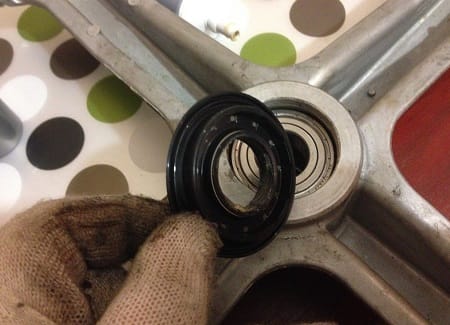
If the cause is found, it must be corrected as soon as possible. The operation of a washing machine with crumbled bearings ends in damage to the sleeve and the shaft on which the drum sits. All this only exacerbates the problem and increases the cost of repairs.
![]() See also - A bra bone got into the washing machine
See also - A bra bone got into the washing machine
Shipping bolts
For a more gentle transportation, special fastening bolts are provided in the body of the washing machine. They fix the shock-absorbing springs and prevent the tank from dangling from side to side. If the fasteners are not removed after installing the unit, the drum will rotate with a loud banging sound. What to do?
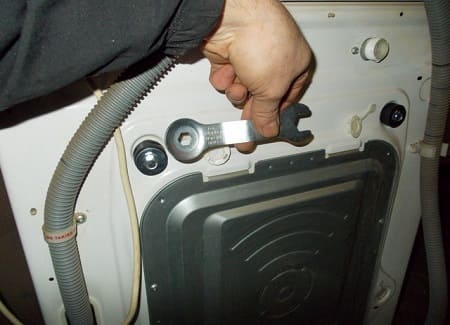
The problem is solved very simply. You just need to unscrew the mounting bolts. The noise will stop. They are located in the back of the machine. By the way, this is written in great detail in each installation and operation manual.
The pulley is loose
When the washing machine hums, makes noise, and clicks loudly as the drum rotates, it could be because the drive pulley is loose. It's easy to check. Turn on the machine in test mode. If this is not the case, a hand wash mode or any other mode in which the drum rotates slowly is suitable. Listen carefully to the sound while looking at the drum. If every time you turn it you hear extraneous noise, or rather, a click, most likely the pulley is to blame.
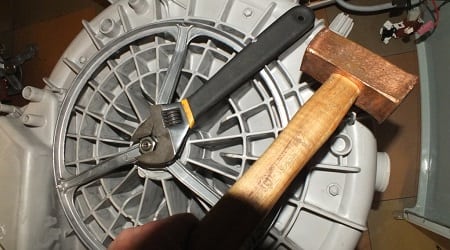
It's easy to fix the situation. Remove the back panel, locate the retaining nut that holds the pulley in position. Using a wrench of a suitable size, remove the backlash by tightening the nut until it stops. If the spinning noise disappeared, then you did everything right. If not, we continue to search.
Counterweights
These rather heavy elements of the washing machine hold the tank in place during the spin cycle. They are designed to extinguish the centrifugal force and resist the rocking of the "washing machine". If you hear a lot of noise or rather a rumble when spinning from the drum, check the counterweights. They are made of concrete, and it tends to deteriorate from old age.
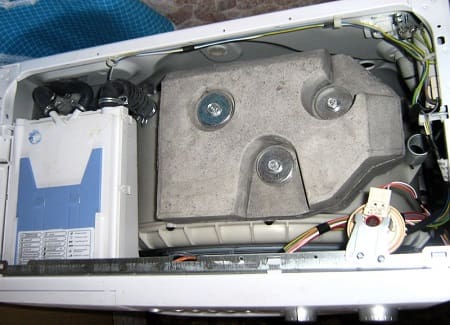
Unscrew the back panel of the washing machine and carefully inspect the counterweights, wiggle them. If the fasteners are loose, tighten them by tightening the corresponding bolts. If you find cracks on any of the counterweights, it is better to replace it completely. If this is not done, then the counterweight can split from strong vibration and damage the internals of the unit. Then you will have to repair a lot more.
![]() See also - Shock absorbers for washing machines: DIY repair and replacement
See also - Shock absorbers for washing machines: DIY repair and replacement
Rubbish and foreign objects
If you hear an unusual ringing, noise or grinding noise during washing or during spinning, the reason may be that some foreign object has got into the tank. This often happens when the hostesses do not check their pockets too carefully. These items can include nuts, coins, paper clips, bra bones, metal buttons, and so on. What to do? How to eliminate extraneous noise?
We'll have to tinker. In order to look into the tank, you need to get to the heating element and unscrew it. Through the hole formed, using long tweezers or simply with your fingers (if possible), get objects that make an extraneous sound. Now you need to put the heating element in place, not forgetting to clean and degrease the rubber seal. It can be lubricated with, for example, liquid detergent.
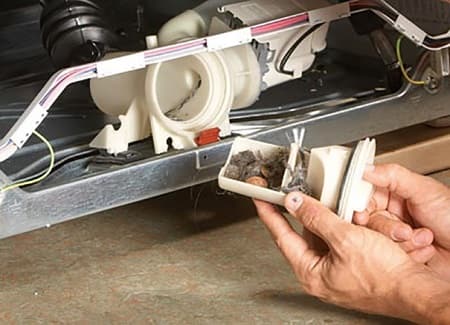
Sometimes the problem is much easier to solve. Some models of "washing machines" have a special sump in which a filter is installed. In this case, you just need to open the sump door. It is most often located in the front. Now we just take out the filter and shake out everything that gets into it.
Defective pump
Sometimes, when the "washing machine" hums and makes noise during the drainage of water, the reason may be damage to the drain pump. You can try to remedy the situation by cleaning the mesh filter. It is located on the front side of the unit, behind a special cover.
You also need to make sure that the drain pipe is clean. This is another reason why the car began to make noise. Clean the pipe, it is likely that the noise will disappear.
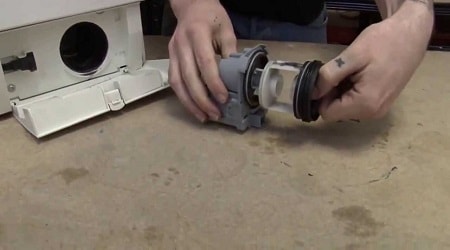
If all else fails and the unit still buzzes and rattles, it's a bad thing. The drain pump is completely out of order and will have to be replaced. In order not to make a mistake, listen carefully to the operation of the unit. The pump can be “suspected” only when the “washing machine” makes noise only during water collection or when it is drained, and the rest of the time it works quietly. The sound will be very similar to the noise of a working transformer.
Rubber compressor
It so happens that during operation, and especially during spinning, the washing machine whistles. At the same time, you find rubber shavings on the cover or walls of the hatch. Most likely, the matter is in the seal. Most often this happens with inexpensive models of "washing machines".
Of course, it is best to replace the seal and find a new one that is the right size.But you can try to solve the problem with the advice of folk craftsmen. Take a small piece of sandpaper, insert it between the front wall and the sealing rubber. Now run any wash cycle of at least half an hour. There is no need to put in linen. The sandpaper will help fit the gum to size. You just have to take it out and remove the rubber debris from the machine. To do this, run an additional rinse cycle and then clean all filters.
Incorrect installation of the washing machine
Sometimes the answer to the question why the house washer rattles and rattles during washing, especially when spinning, is that it is simply not installed correctly. This is not about the electrical part, but simply about its physical location. If the unit is not installed evenly, then when rotating at high speeds, for example, when spinning, centrifugal force will unbalance it. This leads to the following consequences:
- there is a powerful vibration;
- the body of the machine sways or "jumps", moving from place;
- there is a strong thud and drum beat.
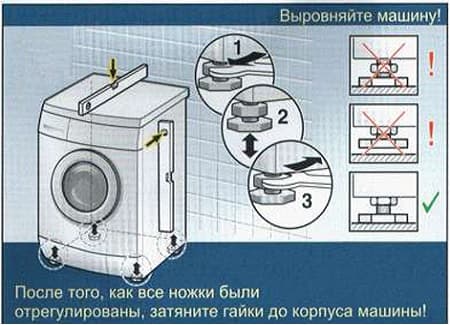
To remedy the situation, nothing needs to be repaired. It is enough just to set the “washer” according to the level by twisting the legs. The sound should disappear.
If, after checking all the reasons described above, you still have not found the reason why the washing machine makes unusual sounds, it may be in the electric motor or the "wired" part of the unit. Here you cannot do without special skills. It is best to call the master. With the help of a multimeter, he will carefully "ring out" all suspicious places and determine the cause of the unregulated sounds.
Prevention
In order to invite the master to your home as rarely as possible, it is enough to follow the simple rules for operating the washing unit. This will not only extend its service life, but also save you unnecessary hassle. What are these rules?
- Do not overload the clipper. It is better to put a little less linen in it than it should be according to the instructions.
- Try to do a wash no more than once a day. This will avoid additional stress on the parts. The washing machine will have time to cool and dry well.
- Clean all possible filters regularly. You can also install additional water purifiers if needed.
- Clean the machine from limescale more often. Use special tools for this and follow the instructions.
- Run the boil program and the spin mode at maximum speed whenever possible. If you do this often, components and parts will fail much faster.
- Before putting things in the machine, do not forget to carefully examine the pockets and folds. Keep buttons and zippers closed and use a bag to wash your bras. All these precautions will save you from "fishing" small items from the bottom of the drum.
And remember: it is not worth delaying the repair of the "home washerwoman". If you dismiss the problem at the initial stage, the matter may worsen and then the repair will cost much more.
See also:

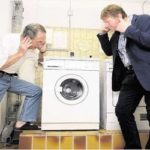
All cars prior to the whirlpool had a lot of noise. And this one is completely inaudible, we have it on an inverter motor. Behaves as quietly as possible